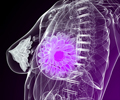Sydney-based researchers hope to find a way to switch off a gene that drives the aggressive disease, which leads to triple-negative breast cancer.

Stem cells have several characteristics similar to that of cancers. They are plastic and flexible, and have the ability to proliferate and spread into other tissues, which are common traits in cancers. The Sydney-based research team has shown that a gene known as inhibitor of differentiation 4 (ID4) determines whether a stem cell remains a stem cell, or whether it differentiates into a specialist cell. Notably, when the high levels of ID4 in a stem cell are ’switched off’, other genes that drive cell specialization are ’switched on’.
Researcher Alex Swarbrick said, "We found that ID4 is produced at high levels in roughly half of all triple negative breast cancers, and that these cancers have a particularly poor prognosis. We also showed that if you block the ID4 gene in experimental models of triple negative breast cancer, the tumor cells stop dividing. Estrogen receptor-positive breast cancers have a relatively good prognosis because the drug Tamoxifen is very effective at blocking the estrogen receptor and hence their growth. We speculate, therefore, that by blocking ID4 it might be possible to turn stem-cell-like breast cancers into less aggressive breast cancers that may even respond to tamoxifen. If we are correct, that would be remarkable."
The study appears online in Nature Communications.
Source-Medindia
 MEDINDIA
MEDINDIA




 Email
Email










